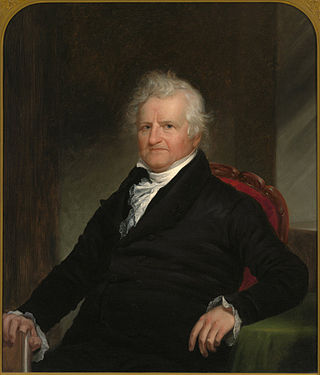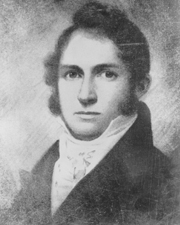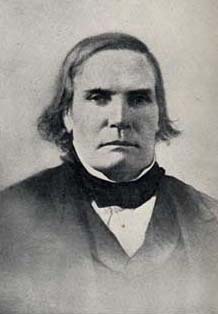Related Research Articles

Joseph Bradley Varnum was an American politician from Massachusetts. He served as a U.S. representative and United States senator, and held leadership positions in both bodies. He was a member of the Democratic-Republican Party.

Thomas Corwin, also known as Tom Corwin, The Wagon Boy, and Black Tom was a politician from the state of Ohio. He represented Ohio in both houses of Congress and served as the 15th governor of Ohio and the 20th Secretary of the Treasury. After affiliating with the Whig Party, he joined the Republican Party in the 1850s. Corwin is best known for his sponsorship of the proposed Corwin Amendment, which was presented in an unsuccessful attempt to avoid the oncoming American Civil War.

The Illinois General Assembly is the legislature of the U.S. state. It has two chambers, the Illinois House of Representatives and the Illinois Senate. The General Assembly was created by the first state constitution adopted in 1818. As of 2023, the current General Assembly is the 103rd; the term of an assembly lasts two years.

The Illinois House of Representatives is the lower house of the Illinois General Assembly. The body was created by the first Illinois Constitution adopted in 1818. The House under the current constitution as amended in 1980 consists of 118 representatives elected from individual legislative districts for two-year terms with no limits; redistricted every 10 years, based on the 2010 U.S. census each representative represents approximately 108,734 people.

James Alexander McDougall was an American attorney and politician elected to statewide office in two U.S. states, then to the United States House of Representatives and United States Senate. A gifted orator, McDougall began his career as a civil engineer in New York, then read law, rising quickly to heights in his profession in Illinois, where he became a friend of fellow Illinois attorneys Abraham Lincoln, Edward D. Baker, and Stephen Douglas. Like many Americans, McDougall was drawn to Gold Rush California in 1849; he resumed his law practice and was elected second attorney general for the new state of California. In the election of 1860, Lincoln won the presidency as a Republican, Baker was elected Republican senator from Oregon, and McDougall was elected senator from California, joining Douglas in the Senate as fellow War Democrats. All three of McDougall's Illinois friends would die in the six years before his term as senator expired. A noted drinker, McDougall once gave an address to the Senate disparaging a proposed rule to outlaw the sale of alcohol in the United States Capitol, but died shortly after leaving the Senate, "...hastened by his indulgence in the bowl."

John McLean was a United States representative and a Senator from Illinois. He was the brother of Finis McLean and uncle of James David Walker.
New York is a Democratic stronghold and is considered one of the "Big Three" Democratic strongholds alongside California and Illinois. The following table indicates the party of elected officials in the U.S. state of New York:

Henry Latimer was an American physician and politician from Newport, Delaware. He was elected to the Continental Congress from Delaware, and was a member of the Federalist Party, who served in the Delaware General Assembly, as U.S. Representative from Delaware, and U.S. Senator from Delaware.

Thomas Clayton was an American lawyer and politician from Dover in Kent County, Delaware. He was a member of the Federalist Party and later the National Republican Party and the Whig Party. He served in the Delaware General Assembly, as Attorney General of Delaware, as Secretary of State of Delaware, as Chief Justice of the Delaware Supreme Court, as U.S. Representative from Delaware, and as U.S. Senator from Delaware. In 1846 he was one of two members of the United States Senate to vote against declaring war on Mexico.

Lyman Trumbull was an American lawyer, judge, and politician who represented the state of Illinois in the United States Senate from 1855 to 1873. Trumbull was a leading abolitionist attorney and key political ally to Abraham Lincoln and authored several landmark pieces of reform as chair of the Judiciary Committee during the American Civil War and Reconstruction era, including the Confiscation Acts, which created the legal basis for the Emancipation Proclamation; the Thirteenth Amendment to the United States Constitution, which abolished chattel slavery; and the Civil Rights Act of 1866, which led to the Fourteenth Amendment to the United States Constitution.

Jesse Burgess Thomas was an American lawyer, judge and politician who served as a delegate from the Indiana Territory to the tenth Congress and later served as president of the Constitutional Convention which led to Illinois being admitted to the Union. He became one of Illinois' first two Senators, and is best known as the author of the Missouri Compromise of 1820. After his retirement from the U.S. Senate in 1829 he lived the rest of his life in Ohio.

Archibald Dixon was a U.S. Senator from Kentucky. He represented the Whig Party in both houses of the Kentucky General Assembly, and was elected the 13th Lieutenant Governor of Kentucky in 1844, serving under Governor William Owsley. In 1851, the Whigs nominated him for governor, but he lost to Lazarus W. Powell, his former law partner.

James Semple was an American attorney and politician. He was Speaker of the Illinois House of Representatives, Attorney General of Illinois, an associate justice of the Illinois Supreme Court, Chargé d'Affaires to New Granada, and United States Senator from Illinois.
Eugenius Aristides Nisbet was an American politician, jurist, and lawyer.

John Edwards was an American Civil War brigadier general in the Union Army, an American politician and a U.S. Representative from Arkansas. He served in Congress for less than a year before being removed from office following allegations of fraud in his 1870 election. Edwards also served in both houses of the Indiana General Assembly and was a member and speaker of the Iowa House of Representatives.

The 1852–53 United States Senate elections were held on various dates in various states, coinciding with the 1852 presidential election. As these U.S. Senate elections were prior to the ratification of the Seventeenth Amendment in 1913, senators were chosen by state legislatures. Senators were elected over a wide range of time throughout 1852 and 1853, and a seat may have been filled months late or remained vacant due to legislative deadlock. In these elections, terms were up for the senators in Class 2.

The 1824–25 United States Senate Elections were held on various dates in various states. As these U.S. Senate elections were prior to the ratification of the Seventeenth Amendment in 1913, senators were chosen by state legislatures. Senators were elected over a wide range of time throughout 1824 and 1825, and a seat may have been filled months late or remained vacant due to legislative deadlock. In these elections, terms were up for the senators in Class 3.

The 4th Illinois General Assembly, consisting of the Illinois Senate and the Illinois House of Representatives, met from November 15, 1824, to January 18, 1825, and again from January 2, 1826, to January 18, 1826, at The Vandalia State House. The apportionment of seats in the House of Representatives was based on the provisions of the First Illinois Constitution. Political parties were not established in the State at the time.
William Melville Alexander was an American politician, physician, and land speculator active in Illinois.
David Blackwell was an American politician who served as the 3rd Illinois Secretary of State and the first Democratic speaker of the Illinois House of Representatives.
References
- ↑ Redmond, Mary (1980). Mr. Speaker: Presiding Officers of the Illinois House of Representatives 1818-1980. Office of the Speaker of the House. pp. 7–8. Retrieved September 8, 2022.
